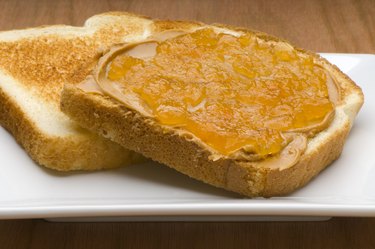
Esophageal spasms occur when the muscles of your esophagus contract and cause pain. They can lead to problems with swallowing, and a bland diet may reduce your risk for them. You may find that some foods on your list of allowed foods tend to trigger esophageal spasms when you eat them, and the best approach is to avoid these foods.
Lean Proteins
Video of the Day
You can have lean proteins, such as chicken, fish, eggs, tofu and shellfish, as well as reduced-fat dairy products, such as milk and yogurt, according to the University of Maryland Medical Center. Cook your meat thoroughly, and grill, steam or roast it so that it does not have added fat. Avoid full-fat dairy products, such as ice cream, strong cheeses, such as bleu cheese, dairy products with nuts or dried fruit in them and smoked or cured meats.
Video of the Day
Fruits and Vegetables
You can have most cooked and canned fruits and vegetables and their juices, according to the University of Maryland Medical Center. Do not eat the skin or seeds of fruit because they can be scratchy and trigger esophageal spasms when you swallow them. Do not have raw fruits or vegetables or french fries, and avoid vegetables that are likely to cause gassiness, such as broccoli, cucumbers, cabbage and corn. Avoid highly seasoned vegetables, such as sauerkraut or pickles, because they can lead to spasms.
Grains
A bland diet for esophageal spasms allows refined grains, which are easier on your esophagus than whole grains because they do not have as much fiber as whole grains. You can have white bread, crackers and pasta, as well as cooked, smooth cereals, such as cream of wheat, according to the University of Maryland. Do not have whole grain or bran products, such as breakfast cereals, whole-wheat bread or whole-grain pasta, and only choose breads without seeds or nuts in them.
Liquids and Soft Foods
A bland diet allows weak tea and broth, and you can also have puddings and custards, according to the University of Maryland Medical Center. You can have creamy, but not crunchy, peanut butter. Avoid hot foods, such as soup, tea or coffee, as well as cold foods, such as ice cream or iced beverages, because these can trigger esophageal spasms. Also, red wine may be a trigger for esophageal spasms. Do not have caffeinated beverages, such as coffee, tea or hot chocolate.